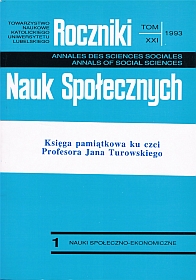A Century of the Church's Social Teaching
Abstract
The paper covers the century of the Church's social teaching whose limits are marked by the two encyclicals: Leo XIII's Rerum novarum (1891) and John Paul II's Centesimus annus (1991). During that time the Church's social doctrine crystallized concerning the social question, with its evolution proceeding from the „class question” to the „world question”.
First the author discusses the social documents of the Magisterium Ecclesiae that were its responses to the „signs of the times” in different historical periods. Then he takes up the evolution of the social question which was formed depending on the circumstances, place and time. Next he concentrates on the „framework” of the social doctrine, analysing successively the notion of man, dignity and rights of the human person, fundamental ethical-social rules and the conception of the common good. Finally he presents the method of the Catholic social teaching, emphasizing the involvement of lay Catholics who are especially responsible for putting it into practice all over the world.
In the end the author stresses that the Church's social teaching is a foundation for the developing dialog with various orientations occurring both in particular countries and in the whole world, that serves constructing a „common home” with various ranges: that of a country, a region, or the world in which „the whole man and each man” is the most important.
Copyright (c) 1993 Roczniki Nauk Społecznych

This work is licensed under a Creative Commons Attribution-NonCommercial-NoDerivatives 4.0 International License.


